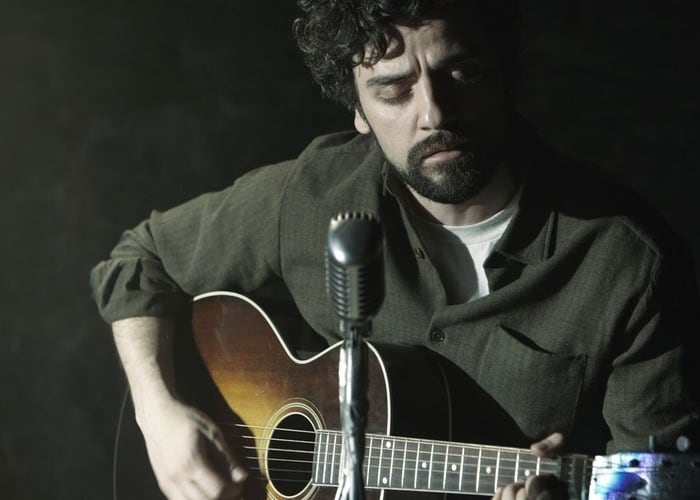
Inside Llewyn Davis is a chronicle of misfortune. Llewyn (Oscar Isaac), a Greenwich Village folk singer struggling to make his career and life work after his musical partner’s suicide, is besieged by the consequences of his own errant ways. His music barely gets him by and his devotion to it is both a lifeline and a hindrance. “You’ve probably heard that one before,” Llewyn smoothly says to the audience during a gig in a New York cafe, the scene that opens the film. “It was never new and it never gets old and it’s a folk song.” Not long after, he gets his ass kicked by a stranger in an alleyway.
The Coen brothers‘ film is set during the American folk revival of the ’60s when musicians borrowed the rural hominess of 19th-century folk music and ushered it into a new age of urban disruption. Irrevocable changes in the American cultural and political landscape were well underway. But Llewyn’s challenges are not in tandem with civil rights or war protest; he’s struggling to retain authenticity, a nearly lost cause in the bubbling New York music scene, where he watches his peers chase the comforts offered by commercial success.
But Llewyn soon finds out that authenticity is not easily defined or measured. What makes a piece of music truly real? Are instrumental characteristics enough to make something a folk song, or does one have to test their emotional endurance and live out the pain of their music in order to be credible? What kind of experiences are tortured enough to be suitably authentic? With each bad day turning into a worse one, Inside Llewyn Davis considers how personal obstacles inform artistic pursuits and whether or not genuine, down-to-the-root authenticity really exists.
When we meet him, Llewyn’s already been through it. He’s completely broke, his father is entering senility, he’s a couch surfer and a bit of an asshole, his beloved musical partner jumped off a bridge and people won’t stop reminding him of it. Llewyn has all of that baggage to bring to an art form that supposedly cherishes the confessional and the personal, but doesn’t have a lick of success to show for it. We’re treated to quiet, anxious bouts of existentialism as Llewyn questions whether or not he has a place in the folk revival.
This hardened lifestyle is measured against the cruising professional success of Llewyn’s acquaintances, especially Jim (Justin Timberlake). Jim is corny, clueless, and worst of all, he’s a total fucking sellout. But his nonsense pseudo-folk songs (“P-p-p-please don’t shoot me into outer space!”) enable a life that Llewyn certainly doesn’t have: an apartment, a winter coat, and a steady relationship. The disconnect between raw emotion and commercial viability weighs on him, constantly threatening to crush whatever is left of his spirit.
Jim isn’t the only reminder of Llewyn’s failures. There’s Jean (Carey Mulligan), Llewyn’s lover and most vitriolic critic; Troy Nelson (Stark Sands), a mechanical military man with a lovely voice; and Al Cody (Adam Driver), a baritone with a knack for strange mouth noises. They are all marginally successful, or on their way there, and Llewyn callously disparages them for using music as anything but a vessel for artistry. “If that’s what music is for you,” Llewyn responds to Jean’s American Dream aspirations, “then yeah, it’s a little careerist. And it’s a little square. And it’s a little sad.” Llewyn’s been dealt a bad hand, but he leans into it just a little, the ideation of his suffering leaving him drained and broke but with the possibility of a good story for future tellings.
Most of the film’s biting punchlines are anchored by a single premise: Llewyn pours all of his pain into music, but that’s beside the point because he’s just not profitable. His tribulations are not premeditated or relished, but he makes rash decisions that foreshadow his own suffering: in one instance, he eschews royalties for a hit record he worked on, instead opting for a check so that he can pay for an abortion. Llewyn isn’t a planner, and he doesn’t want to be, because that would mean playing his cards specifically in pursuit of commercial success — he refuses to be that guy.
For all of Llewyn’s hardships, he still has to maintain the illusion that, someday, all of this will have been worth it. His wealthy Upper West Side friends, the Gorfeins, offer him a bed whenever he needs one — but he accepts it with shame, both because they trot him out as their “folk singer friend” and because we get the feeling that he thinks to be comfortable for too long is to betray his pursuit of authenticity. He makes a trek to Chicago just to have famed producer Bud Grossman (F. Murray Abraham) tell him, “I don’t see a lot of money here.” He is desperate to be taken seriously, and the week that we spend with Llewyn is like watching someone walk a tightrope. He is repeatedly tempted to transgress the unflinching, futile boundaries that he has set for himself.
It’s no wonder that, after that last steely rejection, Llewyn decides it might be time to give it all up and return to the steady merchant job of his past. “Try something new. I mean, something old,” he says; just like a folk song. But even that plan doesn’t come to fruition, and within a day Llewyn is performing at a grubby Greenwich cafe again — it’s the scene from the beginning of the film, whereafter he gets beaten up in that little alleyway. We never really do find out what authenticity means to Llewyn, but that’s what Inside Llewyn Davis is reaching for: it’s difficult to live out an idea that might not even exist.
Related Topics: adam driver, Carey Mulligan, Coen Brothers, Inside Llewyn Davis, Justin Timberlake, Oscar Isaac, Play The Hits, Stark Sands

